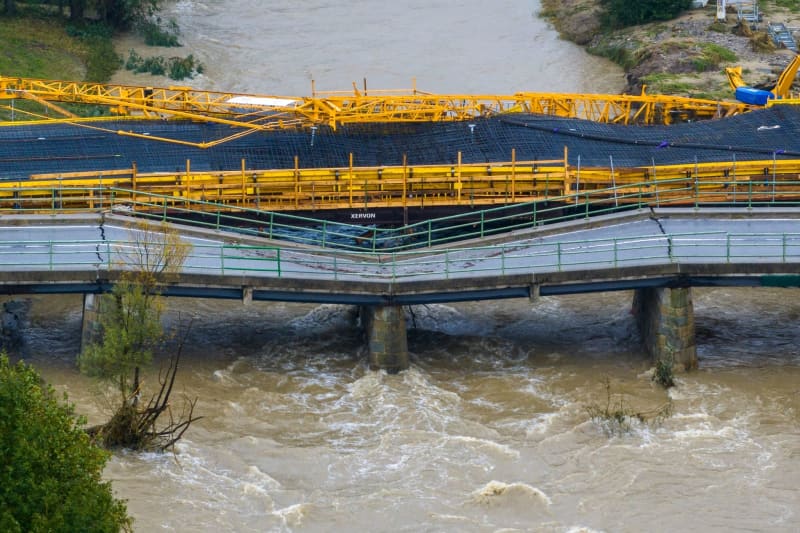More casualties were reported across Central Europe on Monday as parts of Austria, Poland and the Czech Republic continued to be hit by severe flooding and more heavy rain was forecast.
Eleven people have died in flooding that hit the region over the weekend, with the death toll expected to rise.
Among the latest victims are two elderly men who died in their homes in the flood-hit state of Lower Austria, which has been declared a disaster area by the Austrian government.
The flood situation in the eastern region, which surrounds the capital Vienna and borders the Czech Republic, remains serious despite a brief decrease in rainfall overnight, Governor Johanna Mikl-Leitner said on Monday.
“It’s not over yet, it remains critical, it remains dramatic,” Mikl-Leitner added.
Up to 80mm of rain was expected in the state on Monday, putting significant pressure on dams in the region.
In Lower Austria, more than 200 roads have been closed, 1,800 buildings have been evacuated and many students are staying at home, she said.
Currently, approximately 3,500 households are without electricity.
In Lower Austria, up to 370 millimeters of rain has fallen in recent days, several times more than the monthly average of precipitation. A firefighter lost his life last weekend while pumping out a cellar.
The situation could improve somewhat from Tuesday onwards, as the persistent rainfall is expected to end then.
One dead, seven missing in Czech ‘apocalypse’
The Czech Republic reported its first fatality from the floods on Monday, with seven people still missing.
According to Martin Vondrášek, head of the Czech police, a person has drowned in the small Krasová River in the eastern Moravia-Silesia region.
Three of the missing were reportedly trapped in a car that ended up in a raging river near the spa town of Jesenik, near the Polish border. There has been no sign of the vehicle so far.
The other missing persons are believed to have fallen into various bodies of water, including the Otava River. In addition, a man from a nursing home near the Polish border is missing.
Czech Prime Minister Petr Fiala called the situation a once-in-a-century flood.
Last weekend, streets in towns such as Jesenik in the Altvater Mountains, Opava on the river of the same name and Krnov on the border with Poland turned into raging torrents.
In Jesenik, emergency services rescued hundreds of people using boats and helicopters. The town’s mayor said on television: “It was an apocalypse, there is mud everywhere, everything is destroyed.”
The central square in the city centre was temporarily transformed into a mass of water, with cars on it. Several houses in the area collapsed, while authorities reported a risk of landslides after the floodwaters receded.
Entire streets were flooded along the Morava River in Litovel, the CTK news agency reported. Authorities in the small town of nearly 10,000 people appealed to the public to alert emergency services.
Water levels continued to rise in many other places. Evacuation orders were extended in Ostrava, the Czech Republic’s third-largest city, after dikes were breached. A state of danger was declared for the area around the northern Bohemian town of Frýdlant.
Emergency cabinet meeting in Poland as Wroclaw under threat
The situation in southwestern Poland remains tense after Prime Minister Donald Tusk called an emergency cabinet meeting for Monday.
Tusk said he had drafted a decree to declare a state of natural disaster, pending cabinet approval.
The persistent rainfall has led to widespread flooding in areas near the Czech border. One person has been confirmed dead in Poland, with fears that the number could rise.
In the town of Kłodzko in Lower Silesia, entire streets were flooded. At least one person died.
The village of Głuchołazy in the Opole region also suffered heavy damage from flood waters.
The town of Nysa in the Opole region was particularly affected on Sunday evening, when floodwaters from the Nysa Kłodzka, a tributary of the Oder River, inundated the emergency room of the local district hospital, the PAP news agency reported.
A total of 33 patients, including children and pregnant women, were taken to a safe place in rubber boats.
Further downstream, the major western city of Wrocław is bracing for high water later this week, Mayor Jacek Sutryk said Monday morning.
There is 24-hour surveillance of the embankments and the canals and tributaries of the Oder River, which flows through the city, Sutryk said in a video posted on Facebook.
The mayor warned that flooding is currently expected in Wrocław on Wednesday. Earlier weather forecasts indicated that the city could avoid the worst weather conditions.
However, the flooding is not expected to be as bad as in 1997, when a third of the city was under water.
Victims in Romania as Orbán cancels commitments
Other countries have also been hit by the historic storm front. For example, Hungarian President Viktor Orbán announced on the social media platform X that he has postponed all “international obligations” due to “extreme weather conditions and the ongoing flooding in Hungary.”
As Germany braces for flooding from overflowing rivers in border areas, the government in Berlin has pledged support to countries facing flooding should they ask for help.
The situation in Romania remained tense on Monday after at least six people died in heavy rainfall and severe flooding over the weekend.
The regions of Galați, Vaslui and Iași in the east of the country were particularly hard hit, with around 300 people having to be evacuated and around 6,000 farms affected by the floods.
The water hit mostly remote villages, where people climbed onto roofs to avoid being swept away by the floods.

